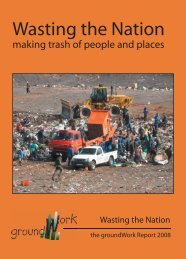Waste Incineration: A Dying Technology - GAIA
Waste Incineration: A Dying Technology - GAIA
Waste Incineration: A Dying Technology - GAIA
Create successful ePaper yourself
Turn your PDF publications into a flip-book with our unique Google optimized e-Paper software.
individuals are great, and wastepicking is rarely a profitable venture. 122 Too often, policymakers<br />
view the informal recycling sector as an obstacle to their plans, rather than as a resource and a<br />
constituency. This reduces to their ability to plan and implement changes in the waste<br />
management system, because wastepickers are the ones who know the current situation the<br />
best and are thus best able to contribute to its redesign. It is also often environmentally unjust:<br />
those who bear a disproportionate burden of society’s environmental ills should not also be<br />
threatened with a loss of livelihood in order to rectify those ills. The challenge of improving<br />
discards management in the global South is not only to minimize waste, but also to improve<br />
conditions for those who make a living from discards.<br />
The Zabbaleen of Cairo 123<br />
Zero <strong>Waste</strong> may be a new name, but it is not a new concept. While waste experts in<br />
wealthy countries have been coming to the realization that resource flows through a society<br />
must be circular rather than linear, the poor of the world have long recognized that any waste is<br />
a potentially profitable resource, and have struggled to take advantage of it, for their own sake.<br />
In so doing, a few communities have succeeded in creating successful systems of resource<br />
management that approach the goal of zero waste and simultaneously employ thousands. One<br />
such example is the zabbaleen of Cairo.<br />
A Zabbaleen sorting out papers and cardboards for recycling in Cairo, Egypt. © CID<br />
The zabbaleen are a community from the south of Egypt who migrated to the city and saw<br />
in its trash an economic opportunity. Working with the traditional collectors of paper, they set<br />
up door-to-door collection systems, with each family working its own daily route, to collect<br />
source-separated household discards. As each collector works the same route, he 124 establishes<br />
a working relationship with the families he collects from. These discards are then separated:<br />
recyclable materials are resold at market rates; food scraps are fed to pigs; and the rest is trucked<br />
to a landfill. Although some families pay the zabbaleen for the garbage pickup service, most of<br />
their income comes from the sale of recyclable materials.<br />
44 <strong>Waste</strong> <strong>Incineration</strong>: A <strong>Dying</strong> <strong>Technology</strong>

















